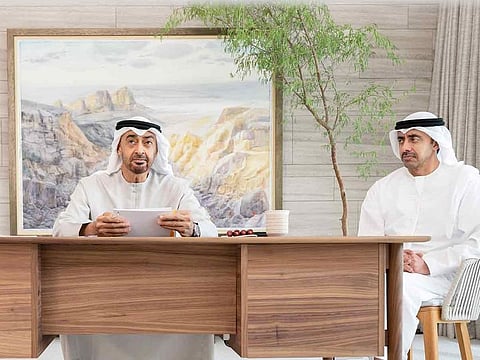UAE announces $2b investment in India’s ‘food parks’ to ease shortages
Our quartet will be model for those who desire peace, prosperity, Mohamed says

Abu Dhabi: The UAE has pledged $2 billion to help develop a series of food parks in India to tackle food insecurity in South Asia and the Middle East, the UAE, India, the US and Israel said on Thursday. The idea is to bring farmers, processors and retailers together in one place using the latest climate technology to minimise waste, conserve water and maximise crop yields.
The four countries would also advance renewable energy projects in India, they said in a statement. “US and Israeli private sectors will be invited to lend their expertise and offer innovative solutions that contribute to the overall sustainability of the project,” the statement said.
“The UAE — home to the International Renewable Energy Agency (IRENA) and host of COP28 in 2023 — will invest $2 billion to develop a series of integrated food parks across India that will incorporate state-of-the-art climate-smart technologies to reduce food waste and spoilage, conserve fresh water, and employ renewable energy sources,” the statement read.
Group to help tackle food insecurity in South Asia and Mideast
“India will provide appropriate land for the project and will facilitate farmers’ integration into the food parks. US and Israeli private sectors will be invited to lend their expertise and offer innovative solutions that contribute to the overall sustainability of the project. These investments will help maximize crop yields and, in turn, help tackle food insecurity in South Asia and the Middle East,” it added.
“This unique grouping of countries aims to harness the vibrancy of our societies and entrepreneurial spirit to tackle some of the greatest challenges confronting our world, with a particular focus on joint investments and new initiatives in water, energy, transportation, space, health, and food security,” the joint statement read.
“We reaffirm our support for the Abraham Accords and other peace and normalisation arrangements with Israel. We welcome the economic opportunities that flow from these historic developments, including for the advancement of economic cooperation in the Middle East and South Asia, and in particular for the promotion of sustainable investment amongst the I2U2 partners,” it added.
The ‘I2U2’ Grouping was conceptualised during the meeting of the Foreign Ministers of the four countries held on October 18 last year. “Each country also has Sherpa-level interactions regularly to discuss the possible areas of cooperation,” the MEA said.
It intends to mobilize private sector capital and expertise to help modernize the infrastructure, low carbon development pathways for our industries, improve public health, and promote the development of critical emerging and green technologies.
The announcement came ahead of a virtual summit held by US. President Joe Biden with UAE, Israeli and Indian leaders that was set to focus on food security and clean energy amid fears of global food shortages caused by the war in Ukraine.
Participating in the 'I2U2' virtual summit, President His Highness Sheikh Mohamed bin Zayed Al Nahyan has reaffirmed the importance of making the most of big challenges to overcome differences and achieve stability and peace.
“Seeking to achieve peace is a common factor between the four nations,” Sheikh Mohamed stressed.
Hybrid renewable energy project
Sheikh Mohamed said partnership is the only way to surpass differences, and hence economic cooperation is the best way to achieve stability and peace.
“I also hope that our quartet will be a model for those who desire peace and prosperity,’’ he said in his opening remarks.
"There's an enormous need around the world for infrastructure," Biden said. "Right now there's a vacuum."
As part of the initiative, the 'I2U2' will also advance a hybrid renewable energy project in India's Gujarat state with 300 megawatts of wind and solar capacity.
Lapid said: “Anyone who understands that we live in a new world with new challenges would succeed and flourish.’’
He added that, “In the 21st century, challenges are local, but the solutions are global.’’
Russia and Ukraine are the world’s third and fourth largest grain exporters, respectively, while Russia is also a key fuel and fertiliser exporter. The war has disrupted their exports, pushed world food prices to record levels and triggered protests in developing countries already contending with elevated food prices due to COVID-related supply chain disruptions.
UN agencies warned this month that the war in Ukraine and climate change could push starvation and mass migration to unprecedented levels.
Economic fallout from the pandemic, climate change, food insecurity and volatile energy markets, Biden said, had been "made worse by Russia's brutal and unprovoked attack" on Ukraine.
"All these issues require cooperation and coordination, and none of us can mount a comprehensive response on our own," Biden said.
Apart from benefiting local farmers, the food parks would help reduce trade barriers and unify food safety standards, Indian foreign secretary Vinay Kwatra said in New Delhi.
They would also provide India with an opportunity to benchmark its perishable food products for global export and allow Indian produce access to the strategic Gulf markets starting with UAE, Kwatra said.
He said Indian states Gujarat and Madhya Pradesh - both ruled by Prime Minister Narendra Modi's Bharatiya Janata Party - were exploring setting up these parks, which would initially cultivate bananas, potatoes, rice, onions and spices.
Gulf Arab states import as much as 80-90% of their food and while their oil wealth renders them less vulnerable to rising global food prices than poorer countries in the region, disruptions threaten their supply chains.
Sign up for the Daily Briefing
Get the latest news and updates straight to your inbox







